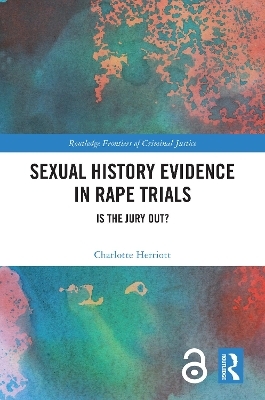
Sexual History Evidence in Rape Trials
Routledge (Verlag)
978-1-032-38477-1 (ISBN)
This book provides an in-depth examination of current, high-profile debates about the use of sexual history evidence in rape trials and its impact on jurors. In doing so, it presents findings of the first mock jury dataset in England and Wales to explore how jurors interpret, discuss, and rely upon such evidence within their deliberations.
Drawing on both qualitative and quantitative insights from the 18 mock jury panels, the book highlights the complex, nuanced and intersectional impact of sexual history evidence within the deliberative ideal. Indeed, findings exemplified routine and ongoing prejudicial framings of sexual history amongst jurors, and frequent endorsement of rape myths that served to mistakenly infer relevance and undermine the perceived credibility of the complainant. The findings discussed within this book are therefore key to addressing the current knowledge gap around the impact of sexual history evidence and are embedded within broader discussions about evidential legitimacy in rape trials. The book draws on good practice observed in other jurisdictions to makes numerous recommendations for change.
Aiming to inform academic, policy, and legislative discussions in this area, Sexual History Evidence in Rape Trials will be of great interest to students and scholars of Criminal Law and Criminology, as well as policy makers and legal practitioners.
The Open Access version of this book, available at www.taylor francis.com, has been made available under a Creative Commons Attribution- Non Commercial- No Derivatives 4.0 license.
Charlotte Herriott is a Lecturer in Criminology and Policing at Anglia Ruskin University, UK. Charlotte's PhD, on which this book is based, was the first research in England and Wales to examine the impact of sexual history evidence on mock jury deliberations in rape trials. Her current research interests relate to sexual violence, particularly criminal justice responses and sexual violence within the UK armed forces. Charlotte is working with colleagues within ARU’s Veteran’s and Families Institute, examining the service justice system response to sexual offending and exploring military-specific factors which may complicate responses to sexual offending. She teaches on a variety of modules across the criminology programme, focusing mainly on areas of violence, sexual violence, and the criminal justice system.
Chapter One - Introduction: Situating the Debate
Chapter Two – Mock Jury Simulations: Insights through the Looking Glass
Chapter Three - Sexual History Evidence: "The Canary in the Criminal Justice Mine?"
Chapter Four - Taking Stock: S.41 in Operation
Chapter Five - ‘No doesn’t always mean no’: Socio-Sexual Stereotypes and Heteronormativity
Chapter Six - ‘Was she that type of girl?’: Sexual History Evidence and Constructions of Complainant Credibility
Chapter Seven - Sexual History Evidence: A Complicating Factor?
Chapter Eight - Lessons to be Learnt from Other Jurisdictions?
Chapter Nine - Back to the Drawing Board?
| Erscheinungsdatum | 10.03.2023 |
|---|---|
| Reihe/Serie | Routledge Frontiers of Criminal Justice |
| Zusatzinfo | 5 Tables, black and white; 5 Line drawings, black and white; 5 Illustrations, black and white |
| Verlagsort | London |
| Sprache | englisch |
| Maße | 156 x 234 mm |
| Gewicht | 620 g |
| Themenwelt | Recht / Steuern ► Allgemeines / Lexika |
| Recht / Steuern ► EU / Internationales Recht | |
| Recht / Steuern ► Strafrecht ► Kriminologie | |
| Recht / Steuern ► Strafrecht ► Strafverfahrensrecht | |
| Sozialwissenschaften ► Soziologie ► Gender Studies | |
| ISBN-10 | 1-032-38477-8 / 1032384778 |
| ISBN-13 | 978-1-032-38477-1 / 9781032384771 |
| Zustand | Neuware |
| Haben Sie eine Frage zum Produkt? |
aus dem Bereich


